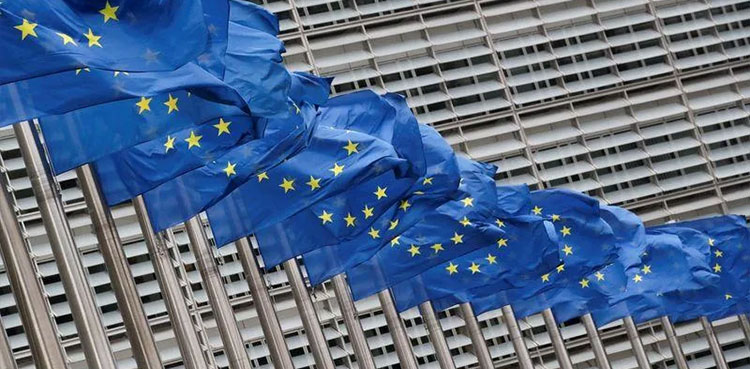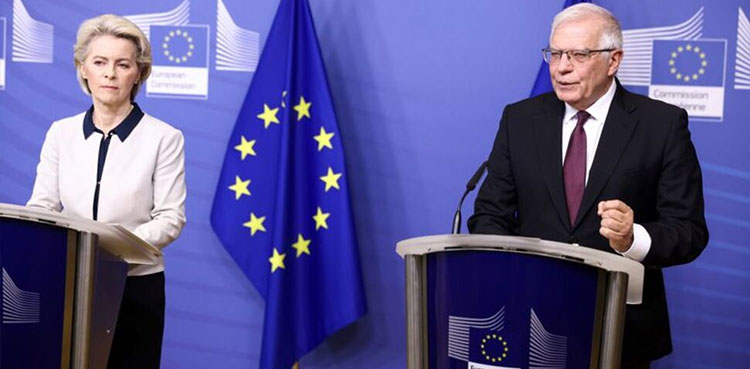
BRUSSELS: The European Union will impose new sanctions on Russia targeting industry, financial sectors and export controls over Moscow’s invasion of Ukraine, an EU diplomat said on Thursday.
“We want the biggest possible package, targeting industrial sectors, export controls, financials, maybe visa policy”, the diplomat said, adding that EU sanctions would target Russian oligarchs, especially those around President Vladimir Putin.
EU leaders will hold an emergency summit starting at 1900 GMT to discuss the sanctions, after Russian forces invaded Ukraine on Thursday in a massed assault by land, sea and air.
European Union leaders said on Thursday they would slap harsh new sanctions on Russia over its invasion of Ukraine, targeting Russia elites and hitting its economy hard.
The new sanctions will include freezing Russian assets in the 27-nation bloc, halting banks’ access to European financial markets and hitting “Kremlin interests”.

The bloc will also target Russia’s trade, energy and transport, among other sectors, and include export controls, in what the EU’s foreign policy chief, Josep Borrell described as “the harshest package of sanctions we have ever implemented.”
“Our sanctions will hurt the Russian economy in its heart,” Belgian Prime Minister Alexander De Croo said as he arrived for an emergency summit of EU leaders.
But a sense of Western leaders’ powerlessness to stop a war they had seen coming could be felt even before the summit began.
“We were not successful enough, not decisive enough to prevent Russia from this step, which is a tragedy for Ukraine, a tragedy for Europe and a tragedy for Russia itself,” Lithuanian President Gitanas Nauseda said.
“I believe still in the potential … of the EU in preventing such actions in the middle of Europe. For this we need to take action,” he said. “Tomorrow might be too late.”
There are differences of view across the 27 member states over how far to go with sanctions, with some that could face the harshest economic backlash themselves pressing to keep the most severe steps in reserve.
That became immediately clear, with De Croo saying the bundle of sanctions on the table needed to be extended.
“We need sanctions that bite and … in a very thorough way. And I don’t think we should be coming back for a third package, the second package needs to be the good one,” he said.
Russian forces rained missiles on Ukrainian cities, including the capital Kyiv, and landed troops on its Black and Azov Sea coasts on Thursday, in the biggest attack by one state against another in Europe since World War Two.
‘MASSIVE AND SEVERE CONSEQUENCES’
The summit will also discuss offering EU candidate status to Ukraine, Nauseda said earlier, a step Kyiv has long called for, though it may not win approval from all leaders.
A draft of the summit’s conclusions, seen by Reuters, said the new round of sanctions “will impose massive and severe consequences on Russia for its action, in close coordination with our partners and allies.”
Russian assets in the EU would be frozen and Russian banks’ access to Europe’s financial markets would be stopped.
However, cutting Russia off the SWIFT global interbank payments system, one of the toughest steps the West could impose, is unlikely to be agreed at this stage, EU sources said.
Differing levels of dependency on Russian gas across EU member states could complicate the adoption of sanctions or limit their ambition, with some keen to see a gradual approach.
“Whereas some members have pushed for stronger sanctions in the face of a full-out Russian invasion, others are reluctant,” one EU diplomat said.
The diplomat said Italy, Germany and Cyprus are among those that prefer a step-by-step approach, while Central European and Baltic states – those closest to Russia – want a harder stance.
“We support the most serious package of sanctions against Russia,” Slovenian Prime Minister Janez Jansa said, wearing a tie with the Ukrainian flag’s yellow and blue colours. “Russia needs to feel that the price of aggression is significant.”
The EU approved a first round of sanctions on Wednesday, including blacklisting Russian politicians and curbing trade between the EU and two breakaway regions of eastern Ukraine whose independence Moscow has recognised.
The EU will also prepare new sanctions against Belarus. Ukraine’s border guard service said Russian troops used Belarus as one of their entry points with Belarusian support.
The EU will also prepare a new aid package for Ukraine and help with evacuation operations, including of EU staff.
from Business News updates - Latest news stories on Economy from Pakistan https://ift.tt/0UMguGc



0 Comments